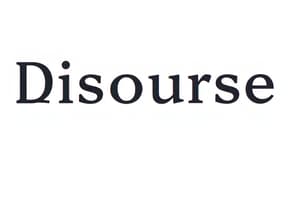Podcast
Questions and Answers
What does discourse analysis focus on, unlike linguistic approaches?
What does discourse analysis focus on, unlike linguistic approaches?
- Smaller units of language
- The contextual meaning of language (correct)
- The rules of language use
- Sounds, words, or phrases
In discourse analysis, what is studied in larger chunks of language?
In discourse analysis, what is studied in larger chunks of language?
- Words
- Entire conversations (correct)
- Phrases
- Sounds
What aspect of vocabulary can be analyzed in discourse analysis for ideological associations?
What aspect of vocabulary can be analyzed in discourse analysis for ideological associations?
- Synonyms
- Verb tenses
- Formality (correct)
- Pronouns
What does grammar analysis in discourse analysis focus on?
What does grammar analysis in discourse analysis focus on?
Which aspect of language use does discourse analysis explore to understand how people achieve specific effects?
Which aspect of language use does discourse analysis explore to understand how people achieve specific effects?
What distinguishes discourse analysis from linguistic approaches in terms of what is focused upon?
What distinguishes discourse analysis from linguistic approaches in terms of what is focused upon?
What is the main message conveyed in paragraph 16?
What is the main message conveyed in paragraph 16?
What is a key aspect of discourse analysis?
What is a key aspect of discourse analysis?
What does the text suggest about singlehood?
What does the text suggest about singlehood?
In the context of the text, what does discourse analysis aim to understand?
In the context of the text, what does discourse analysis aim to understand?
Based on the text, what is a potential focus of discourse analysis?
Based on the text, what is a potential focus of discourse analysis?
What is emphasized concerning marriage decisions in paragraph 16?
What is emphasized concerning marriage decisions in paragraph 16?
What is the primary focus when analyzing the structure of a text?
What is the primary focus when analyzing the structure of a text?
In discourse analysis, what do non-verbal aspects of speech, like tone of voice and gestures, reveal?
In discourse analysis, what do non-verbal aspects of speech, like tone of voice and gestures, reveal?
What does defining a research question help with in discourse analysis?
What does defining a research question help with in discourse analysis?
Which aspect of communication in a conversation can reveal cultural conventions and social roles?
Which aspect of communication in a conversation can reveal cultural conventions and social roles?
What is a key difference between discourse analysis and content analysis?
What is a key difference between discourse analysis and content analysis?
When conducting discourse analysis, why is it essential to select a range of appropriate material?
When conducting discourse analysis, why is it essential to select a range of appropriate material?
Flashcards
Discourse Analysis
Discourse Analysis
A research method studying language in social contexts, to understand how it's used in real life.
Focus of Discourse Analysis
Focus of Discourse Analysis
Understanding language's purposes, effects, cultural rules, values, and social/political/historical context.
Discourse Analysis Materials
Discourse Analysis Materials
Books, news, marketing, documents, websites, social media, interviews, and other communication sources.
Vocabulary Analysis
Vocabulary Analysis
Signup and view all the flashcards
Grammar Analysis
Grammar Analysis
Signup and view all the flashcards
Structure/Genre Analysis
Structure/Genre Analysis
Signup and view all the flashcards
Nonverbal Communication
Nonverbal Communication
Signup and view all the flashcards
Conversational Codes
Conversational Codes
Signup and view all the flashcards
Discourse Analysis Method
Discourse Analysis Method
Signup and view all the flashcards
Research Question
Research Question
Signup and view all the flashcards
Analysis Content Selection
Analysis Content Selection
Signup and view all the flashcards
Analysis Approaches
Analysis Approaches
Signup and view all the flashcards
Contextual Meaning
Contextual Meaning
Signup and view all the flashcards
Linguistic Approaches
Linguistic Approaches
Signup and view all the flashcards
Qualitative Research
Qualitative Research
Signup and view all the flashcards
Disciplines Using DA
Disciplines Using DA
Signup and view all the flashcards
Social Aspects of Communication
Social Aspects of Communication
Signup and view all the flashcards
Study Notes
Discourse Analysis
- Materials suitable for discourse analysis include books, newspapers, marketing materials, government documents, websites, social media posts, and interviews.
- Researchers aim to understand social groups and how they communicate through these materials.
Difference from Other Methods
- Discourse analysis emphasizes contextual meaning of language, focusing on social aspects of communication.
- It differs from linguistic approaches, which focus only on rules of language use.
Levels of Analysis
Vocabulary
- Words and phrases can be analyzed for ideological associations, formality, and euphemistic and metaphorical content.
Grammar
- Sentence construction (verb tenses, active/passive, imperatives, and questions) can reveal aspects of intended meaning.
Discourse Analysis Definition
- Discourse analysis is a research method for studying written or spoken language in relation to its social context.
- It aims to understand how language is used in real-life situations.
Focus of Discourse Analysis
- Purposes and effects of different types of language
- Cultural rules and conventions in communication
- How values, beliefs, and assumptions are communicated
- How language use relates to its social, political, and historical context
Applications of Discourse Analysis
- Qualitative research method in humanities and social science disciplines (linguistics, sociology, anthropology, psychology, and cultural studies)
- Examines how language functions and creates meaning in different social contexts
- Can be applied to written or oral language, as well as non-verbal aspects of communication
Structure and Genre Analysis
- Structure of a text can be analyzed for emphasis and narrative building
- Texts can be analyzed in relation to the conventions and communicative aims of their genre
Non-Verbal Communication and Conversational Codes
- Non-verbal aspects of speech (tone, pauses, gestures, and sounds) can reveal aspects of a speaker's intentions, attitudes, and emotions.
- Conversational codes (turn-taking, interruptions, and listener response) can reveal cultural conventions and social roles.
Conducting Discourse Analysis
- Qualitative and interpretive method of analyzing texts
- Involves making interpretations based on both material details and contextual knowledge
- Basic steps: define the research question, select the content of analysis, and follow different approaches and techniques
Studying That Suits You
Use AI to generate personalized quizzes and flashcards to suit your learning preferences.
Description
Explore the materials suitable for discourse analysis and understand how researchers gain insights into social groups through analyzing different forms of communication. Learn about the distinctions between discourse analysis and linguistic approaches.




